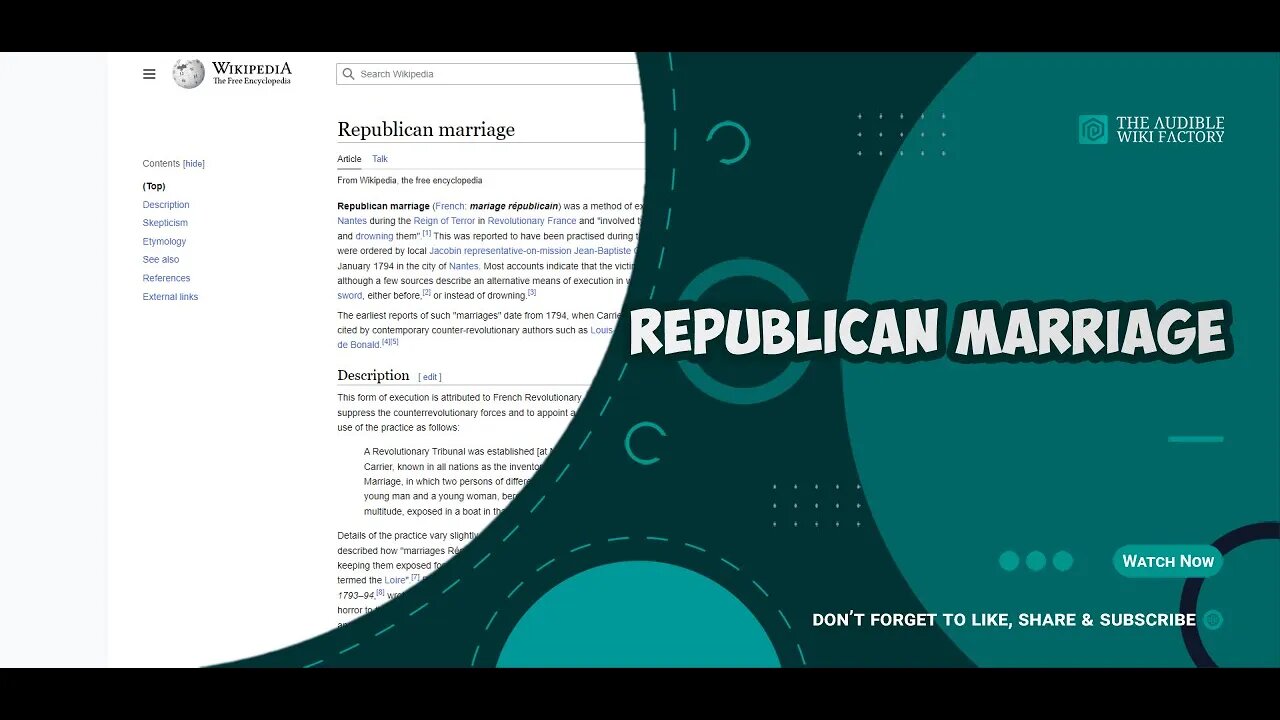Premium Only Content

Republican marriage was a method of execution that allegedly occurred in Nantes during the
Republican marriage (French: mariage républicain) was a method of execution that allegedly occurred in Nantes during the Reign of Terror in Revolutionary France and "involved tying a naked man and woman together and drowning them". This was reported to have been practised during the drownings at Nantes (noyades) that were ordered by local Jacobin representative-on-mission Jean-Baptiste Carrier between November 1793 and January 1794 in the city of Nantes. Most accounts indicate that the victims were drowned in the river Loire, although a few sources describe an alternative means of execution in which the bound couple is run through with a sword, either before, or instead of drowning.
The earliest reports of such "marriages" date from 1794, when Carrier was tried for his crimes, and they were soon cited by contemporary counter-revolutionary authors such as Louis-Marie Prudhomme and Louis Gabriel Ambroise de Bonald.
DESCRIPTION
This form of execution is attributed to French Revolutionary Jean-Baptiste Carrier, who was sent to Nantes to suppress the counterrevolutionary forces and to appoint a Revolutionary Committee. One historian described the use of the practice as follows:
A Revolutionary Tribunal was established [at Nantes], of which Carrier was the presiding demon—Carrier, known in all nations as the inventor of that last of barbarous atrocities, the Republican Marriage, in which two persons of different genders, generally an old man and an old woman, or a young man and a young woman, bereft of every kind of clothing, were bound together before the multitude, exposed in a boat in that situation for half an hour or more, and then thrown into the river.
Details of the practice vary slightly, but are generally consistent with the description offered above. One author described how "marriages Républicains... consisted in binding together a man and woman, back to back, stripped naked, keeping them exposed for an hour, and then hurling them into the current of "la Baignoire Nationale", as the bloodhounds termed the Loire". British radical and Girondist sympathizer Helen Maria Williams, in her Sketch of the Politics of France, 1793 to 94, wrote that "innocent young women were unclothed in the presence of the monsters; and, to add a deeper horror to this infernal act of cruelty, were tied to young men, and both were cut down with sabers, or thrown into the river; and this kind of murder was called a republican marriage".
According to literary scholar Steven Blakemore, Williams seems to have regarded this as a form of "terrorist misogynism". Williams' description of the women as "innocent", in his view, "not only suggests that they were not guilty of aiding the rebels, but that they were young 'virgins'". He argues that in Williams' text, the male Jacobin executioners are portrayed as "sadistic, public voyeurs who delight in tying 'counter-revolutionary' men and women into forced positions of sterile intercourse, in a grotesque 'marriage' of the soon-to-be dead". Thus, "if the Old Regime, for Williams, represents the forced confinement of female beauty, the Terror represents beauty's degrading death".
SKEPTICISM
While the executions of men, women and children by drowning in Nantes is not generally disputed, the factual nature of the "republican marriages," in particular, has been doubted by several historians who alleged it to be a legend. The claim that such a manner of execution has been practised and ordered by Carrier appears for the first time in the trial of the members of the Revolutionary Committee of Nantes by the Revolutionary Tribunal in 1794. It was present in the report of Charles-Gilbert Romme and in several letters and witness testimonies. However, while a few witnesses asserted that they had heard about...
LINK TO ARTICLE: http://en.wikipedia.org/wiki/Republican_marriage
TAGS: Republican marriage, Women and death, Violence in France, Capital punishment in France, Execution methods, 1794 events of the French Revolution, 1793 events of the French Revolution
#GeneralKnowledge #AudibleWikiFactory #Audible #Wikipedia #Republicanmarriage
-
 6:00
6:00
The Audible Wiki Factory
1 year agoThe Gion Festival is one of the largest and most famous festivals in Japan, taking place
399 -
 LIVE
LIVE
Adam Does Movies
6 hours agoAsk Me Anything - Live!
230 watching -
 LIVE
LIVE
Flyover Conservatives
21 hours agoFollow the Money: $4.7 Trillion in Government Fraud EXPOSED!; Flu Shots, Fear & Big Pharma Lies—What They DON’T Want You to Know - Dr. Stella Immanuel | FOC Show
638 watching -
 LIVE
LIVE
Anthony Rogers
1 day agoEpisode 354 - Current Events, Weather, and Other Clickbait
88 watching -
 25:10
25:10
Producer Michael
6 hours agoTHE HOTTEST FRAGRANCES FOR 2025!
8.46K -
 18:44
18:44
Clownfish TV
5 days agoHollywood Has a DEI Temper Tantrum!
5.79K7 -
 1:01:42
1:01:42
The StoneZONE with Roger Stone
2 hours agoRoger Stone Provides Crucial Update On Classified JFK Assassination Docs | The StoneZONE
15.9K4 -
 1:09:44
1:09:44
Slightly Offensive
3 hours ago $2.74 earnedALMOST SERIOUS: How Mass Legal Immigration DESTROYED Australia | Guest: Maria Zeee
21.8K3 -
 54:43
54:43
LFA TV
1 day agoTrump vs. Karl-Theodor zu Guttenberg | TRUMPET DAILY 2.18.25 7PM
19.6K4 -
 2:02:21
2:02:21
Revenge of the Cis
8 hours agoEpisode 1449: Boo This
71.9K13